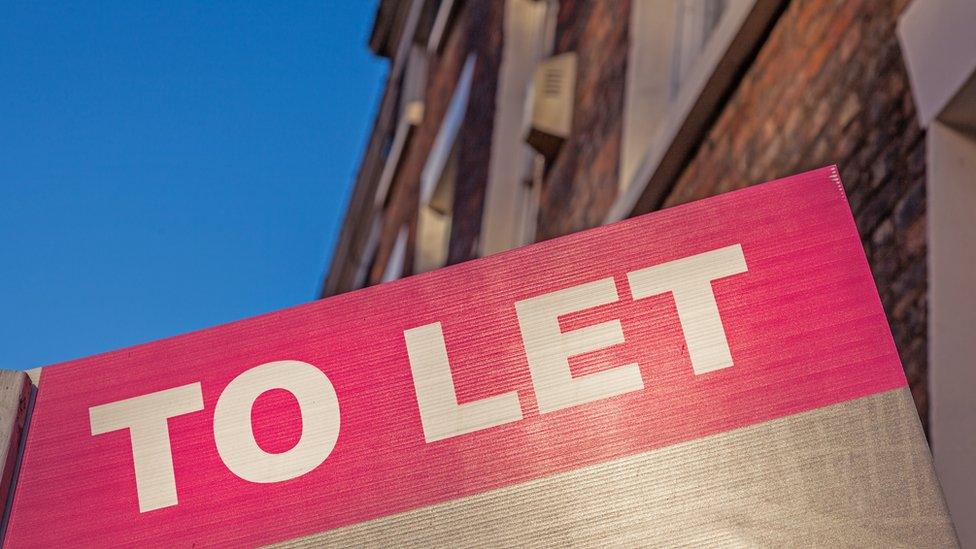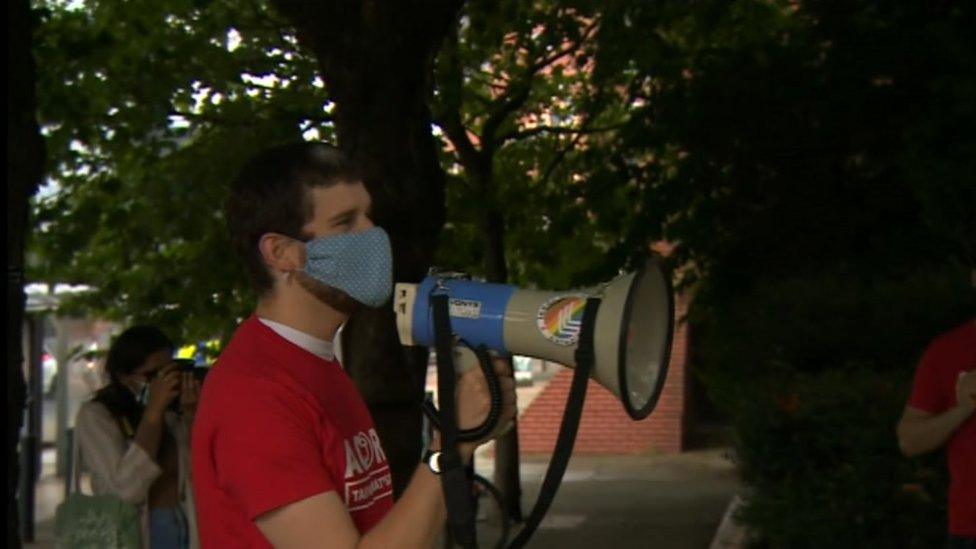Coronavirus: Call to extend eviction ban due to pandemic
- Published
- comments

Before coronavirus, landlords only had to give tenants two months' notice before eviction
There are calls for renters in Wales to get more protection from eviction over fears that homelessness services could "crack" under increased demand.
In England - except in certain circumstances - renters will get six months' notice of their landlord's plan to evict them until March 2021.
Shelter Cymru said private renters were among the hardest-hit by the pandemic.
The Welsh Government said it would keep its own six-month notice period, due to expire in September, "under review".
Shelter wants ministers to use emergency coronavirus powers to give renters in Wales the same protection as those in England.
In Scotland, a proposal for six months of notice until March requires approval from the Scottish Parliament, while laws in Northern Ireland include a 12-week notice period.
A YouGov poll of just over 1,000 households in Wales, commissioned by Shelter Cymru, suggested an estimated 15,000 private renters had been threatened with eviction since the start of lockdown.
The charity called the number "off the scale" compared to the usual number of about 1,500 renters a year.
At the start of the pandemic, the law was changed so landlords would have to give tenants three months' notice for eviction, instead of two.

Jennie Bibbings urged the Welsh Government to extend the emergency legislation
Jennie Bibbings, from Shelter Cymru, said homelessness services in Wales would come under increased pressure when the ban on court-ordered evictions comes to an end on 20 September.
"We are not out of the woods, more people are going to lose their jobs and their homes," she said.
"The Welsh Government needs to extend the emergency legislation to at least the end of March or ideally for another 12 months so that tenants have that breathing space."
But the National Residential Landlords Association (NRLA) said the extension was "unacceptable" and called on government to compensate private landlords for lost income during the pandemic.
Douglas Haig, from the NRLA in Wales, said the courts were needed to deal with cases where tenants were committing anti-social behaviour or hade long-standing rent arrears unrelated to the pandemic.
Latest data from Rent Smart Wales suggests more than 70,000 private tenants have fallen behind on rent payments since the start of the pandemic.

Many people are struggling to pay the rent during the pandemic and face the prospect of eviction
Beth - not her real name - a teaching assistant in Blaenau Gwent, was issued a Section 8 "notice to quit", external in July, along with her roommate.
It gave them three months to pay their rent arrears or move out.
Beth fell behind on her rent after being furloughed from her job in March.
She is hoping to be back to work in September and wants to arrange a repayment plan with her landlord who, she says, is "not being very communicative".
She said the property was "pretty much all I have" after paying £14,000 in rent over three years.
"The fact that I've been a good tenant doesn't seem to mean anything, not to my landlord, not to my estate agents, not the government," she said.
"It feels like I shouldn't even try and build anything going forward because it could all just be taken away from me."
She and her roommate were given their notice just before the Welsh Government extended the notice period to six months.
The Welsh Government has also introduced a loan scheme allowing renters to borrow money to pay back arrears built up during the pandemic and Beth said she hoped she would be eligible to apply.
"My living plans are uncertain, putting me under a great deal of stress," she said.
"And I'm going to have to go back in a few weeks' time and teach our nation's children and do it with a smile on my face."
Ms Bibbings fears landlords could benefit from tenants using the loan scheme and "take the money and run", using Section 21 notices, external, so-called no fault evictions, to get rid of tenants they fear may not be able to pay their rent.
She said putting the six-month notice period in place until at least March would ensure landlords "can't use eviction as a quick fix to get rid of tenants once they've taken out a loan and they receive that money".
"This is the most important emergency measure that the government needs to take," she added.
A Welsh Government spokesman said: "We will continue to work closely with stakeholders to monitor impacts in the rented sector."
- Published22 August 2020

- Published21 August 2020

- Published3 August 2020

- Published15 July 2020
